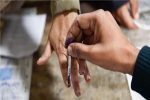
Brain process behind revenge-seeking behaviour decoded
PTI, Mar 4, 2020, 12:14 PM IST

Beijing: Levels of the ‘love hormone’ oxytocin may increase in people engaged in conflict, and influence the section of the brain associated with decision-making activity, according to a study that sheds more light on the factors that drive people to seek revenge.
The research, published in the journal eLife, noted that increased levels of the hormone lead to a greater feeling of love and empathy among a group, and the desire to seek revenge when attacked by an outside group.
According to the researchers, including those from Peking University in China, the findings may help explain how a process called ‘conflict contagion’ can occur, where a conflict that starts between a few individuals ends up spreading among entire groups.
“The desire to seek revenge for an attack during conflict is universal among humans, but the neurobiological processes that drive it are still unclear,” said Xiaochun Han, lead author of the study from Peking University.
“Building upon previous studies, we suggest there may be a neurobiological mechanism that links pain within a group, known as the ‘ingroup’, caused by an outside group, or ‘outgroup’, with the tendency to seek revenge upon the outgroup,” Han said.
In the study, the researchers developed an experiment that simulates real-life revenge during the conflict between groups.
Based on earlier studies, they said oxytocin is known to play a role in empathy within a group, and in regulating intergroup conflict.
The scientists sought to assess the oxytocin and neural responses to ingroup suffering caused by an outgroup and to see how these responses predicted a desire for revenge.
As part of the experiment, participants watched an ingroup and an outgroup member receive an electric shock that was caused either mutually for the ‘revenge’ group or respectively by a computer — for the ‘control’ group.
The scientists then combined a brain imaging technique called functional magnetic resonance imaging (fMRI) with measurements of oxytocin levels in the members of both groups.
According to the study, the conflict encountered by the revenge group was associated with an increased level of oxytocin compared to the control group.
The scientists also noted that these increased levels of oxytocin predicted the brain activity in the medial prefrontal cortex, a region linked to decision-making, and associated with ingroup pain.
They said this activity, in turn, predicted the desire to seek revenge upon the outgroup regardless of whether some of the individuals were directly involved in the conflict.
“Our experiment allowed us to investigate how harm to an ingroup member caused by an outgroup member inspires an uninvolved ingroup member to seek revenge,” explained Shihui Han, another co-author from Peking University.
“The results highlight an important neurobiological process underpinning the desire for revenge, which may be implicated in conflict contagion during conflict among groups,” Han added.
According to the researchers, there are various motivations for seeking revenge within a group, such as feeling threatened, feeling empathy towards a harmed group member, and feeling pressure to avenge the individual or group as a whole.
“Further studies will be needed to examine these motivations and associated emotions if we are to fully understand the processes that can drive humans to seek revenge,” Han said.
Udayavani is now on Telegram. Click here to join our channel and stay updated with the latest news.
Top News
Related Articles More

World Malaria Day: WHO calls for equitable health access

What role does genetics play in breast cancer? How can genetic testing help with early breast cancer diagnosis?

Father’s diet can affect anxiety in sons, metabolism in daughters: Study in mice finds

Low back pain, depression, headaches main causes of poor health: Study

Surgical options for Parkinson’s disease
MUST WATCH
Latest Additions

Lok Sabha elections 2024: EC takes cognisance of MCC violation by Modi, Rahul; seeks response by April 29

Polali: Case filed against a man for molesting minor

Kotak Mahindra Bank shares tank 13%; mcap erodes by Rs 37,721 crore post RBI action

Lok Sabha polls 2024: Sunita Kejriwal likely to join AAP’s campaign in Delhi, will hold roadshows this weekend

NCBC seeks clarification from Karnataka chief secretary on reservation policy for Muslims






















